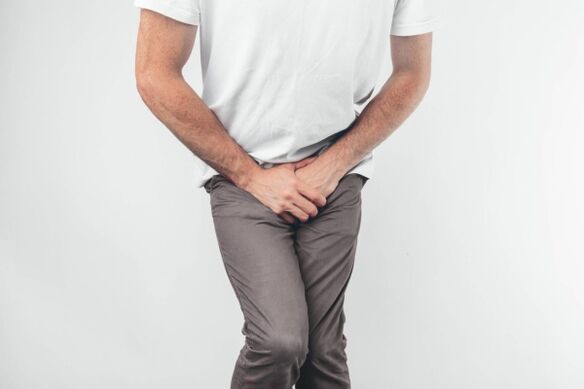There are many reasons for the inflammatory process of the prostate (prostatitis). These are various sexually transmitted diseases (gonorrhea, trichomoniasis), hormonal imbalances, overweight, smoking and alcoholism.
Prostatitis is inflammation of the prostate, which can cause discomfort, interfere with sexual function, and may cause inflammation of the testicles and epididymis, and ultimately lead to infertility. Pathology is observed in men of different ages, but most commonly after 35-40 years of age. There are many reasons for prostatitis.
Acute and chronic infection processes are a factor in the development of prostatitis
Usually, the cause of the development of the inflammatory process of the prostate is the activity of infectious agents. This disease develops as an infection penetrates into the prostate, and the appearance of the prostate is caused by other diseases. Due to their development, the immune system is weakened and the process of reproduction of the pathogenic microbial community begins.
Prostate inflammation is caused by:
- Neisseria gonorrhoeae (the causative agent of gonorrhea);
- Chlamydia (chlamydia pathogen);
- Trichomonas (the causative agent of trichomoniasis);
- cochus bacillus (the causative agent of tuberculosis);
- Candida fungus (the causative agent of candidiasis).
In addition, prostatitis develops under the influence of Escherichia coli, Enterococcus, Pseudomonas aeruginosa, and Staphylococcus.
Violation of blood circulation in the pelvic area
Stasis of blood and fluid in the pelvic area is the result of impaired blood flow in the blood vessels in the area. This phenomenon is related to factors such as a sedentary lifestyle, sedentary work, wearing too tightly, squeezing underwear or tight jeans and pants, and being overweight. Slow blood flow may be related to myocardial work disorder and neurological diseases.
In the presence of these factors, blood will not flow to the prostate in a sufficient amount. This can cause hypoxia and increase the risk of inflammatory processes.
Long-term abstinence, frequent interruption of sexual intercourse
If a man has not had intercourse for a long time, and if he uses intercourse as a contraceptive method, then this can cause inflammation of the prostate.
In the presence of these factors, a special fluid will accumulate in the prostate-this is a secret to ensure sperm motility and fluidity, and under normal circumstances, it will be removed from it. With the interruption of abstinence and sexual intercourse, it will remain in the prostate or only partially excreted due to lack of ejaculation.
Congestion can lead to an increase in organ size and inflammation.
hormone imbalance
Hormonal imbalance, in which the production of testosterone is disrupted, leads to the development of the inflammatory process of the prostate.
Such phenomena can cause hormonal disorders:
- Abnormal glands and organs of the endocrine system (thyroid gland, adrenal gland, pituitary gland);
- Testicular damage, in which testosterone is produced;
- Lack of physical activity;
- Acute and chronic poisoning;
- Improper nutrition;
- Frequent stress
- Living in an unfavorable ecological environment;
- Tumor tumor.
Both the decrease and sharp increase of male sex hormone levels may cause prostatitis.
Injury and hypothermia
Mechanical damage to the pelvic organs and perineum can cause hyperemia of the prostate, which can lead to inflammation. If the injury is severe, it may cause chronic prostatitis.

Hypothermia in the pelvic area, which occurs as a result of staying in ventilation for a long time or due to the wrong choice of clothes (not due to the weather), can also lead to an acute inflammatory process of the prostate. The important thing is that hypothermia will reduce the body's defenses. In this case, the body cannot resist developing diseases.
Constant nervousness
Prostatitis may be of a psychological nature. High-risk groups include men who are constantly under stress, continuous lack of sleep and chronic fatigue, and men who continue to increase their mental stress.
In this case, the trigger is the production of certain "stress" substances-so the nervous system will respond to this situation. In this case, the risk of inflammation will increase.
Bad habits and unhealthy diet
Alcohol and smoking have a negative effect on blood vessels, making them inelastic and fragile. As a result, the blood supply to the prostate is reduced, and the nutrition and oxygen received by the glands are reduced. In this case, inflammation occurs.
Harmful foods: greasy and fried foods, semi-finished products, canned foods, pickles, and beverages such as strong tea and coffee, and sweet soda can reduce immunity. Therefore, the body cannot resist the pathogens that cause inflammation of the prostate.
Digestive problems cause frequent constipation
If a person has irregular bowel movements or frequent constipation, ecological disorders will occur: in this case, the ratio of beneficial and harmful bacteria in the gastrointestinal tract will change towards the latter. As a result, immunity decreases and the body's susceptibility to pathogens increases. In addition, fecal retention will promote the entry of toxins into the colon, which will also have a negative impact on the body's protective function.
Prostatitis is a disease that can cause infertility. This deviation occurs under the influence of many reasons: from pelvic organ damage to psychological factors. Finding out the cause of prostate inflammation and eliminating it can make progress in pathological treatment.































